With soft skills and effective mentorship, Mumbai NGO Antarang is helping fill the gap for Mumbai teenagers from less-privileged backgrounds to make a safe transition from education to employment

NGO Antarang has a two-pronged strategy -- career counselling for 14-18-year-olds, to help them stay in the education system until they are at least 18 years, and an employability skills training programme for the 18-25 year age group.
![]() You might spot Avinash Yelve brewing your coffee at a Starbucks outpost in Mumbai. And as he serves up your cappuccino, he’s soaking in every minute. Why? Yelve dropped out of the education system after grade 12, and worked in a sari shop to earn for his family. After he lost his job, he had to sit at home for a year and a half. When he met the Antarang team in his chawl, they spoke of training for increased employability, and he decided to join their course, with no career goal in mind. Later, when the international coffee house chain hired him, it changed his life. He never imagined that he, with an indifferent education and social background, could have managed a respectable job. Now as he cycles to work every day, Avinash is optimistic about a future filled with possibilities.
You might spot Avinash Yelve brewing your coffee at a Starbucks outpost in Mumbai. And as he serves up your cappuccino, he’s soaking in every minute. Why? Yelve dropped out of the education system after grade 12, and worked in a sari shop to earn for his family. After he lost his job, he had to sit at home for a year and a half. When he met the Antarang team in his chawl, they spoke of training for increased employability, and he decided to join their course, with no career goal in mind. Later, when the international coffee house chain hired him, it changed his life. He never imagined that he, with an indifferent education and social background, could have managed a respectable job. Now as he cycles to work every day, Avinash is optimistic about a future filled with possibilities.

NGO Antarang has a two-pronged strategy -- career counselling for 14-18-year-olds, to help them stay in the education system until they are at least 18 years, and an employability skills training programme for the 18-25 year age group.
As Antarang opens its first career resource centre at Dharavi, later this month, success stories like Yelve’s convince its founder Priya Agrawal, that they are on the right path. The Non Government Organisation, founded in 2012, works with children in the 14-25-year age group to improve their access to career opportunities in the formal sector. Young adults like Avinash inhabit a unique gap in the educational system in India. While the Right to Education (RTE) Act guarantees free and compulsory education to children up to the age of 14 years, the Labour Laws prohibit the employment of children under the age of 18. For those, who cannot or do not go back to the school system, the market for job opportunities is fairly limited — they can find employment only in the sector, and face a lifetime of less money, exploitation and abuse.
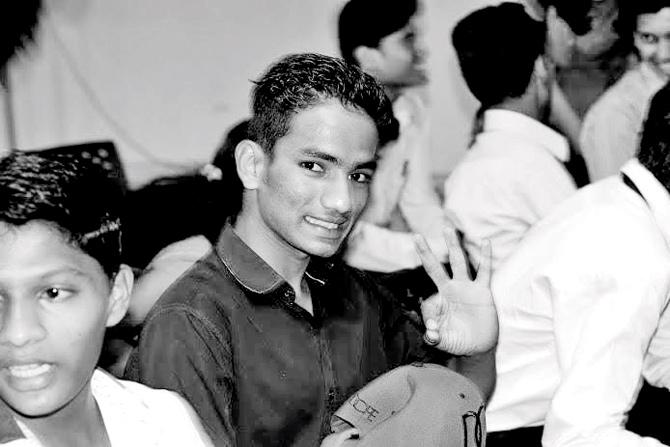
All's well: A student from Antarang smiles for the camera
Career matters
Before founding Antarang, Priya worked with the Akanksha Foundation that runs programmes for less privileged school children. Agrawal recalls, “While working at Akanksha and setting up a programme for gifted children, I realised the huge mentoring and guidance gap that our students faced. It was impossible for children to find answers to ‘What career streams to choose?’ and ‘How to prepare for an interview?’ As a result, many children continued to fall through the cracks — and started working in the often-exploitative informal sector. I wanted to intervene with this age group and address this gap by supporting the young, and helping them make a safe transition from education to employment.”
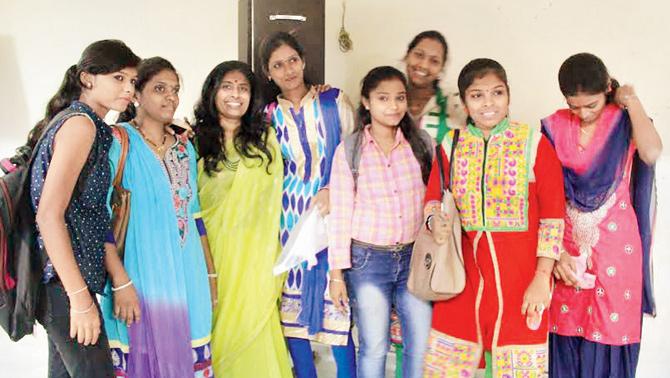 Priya Agrawal (third from left) with students from Antarang
Priya Agrawal (third from left) with students from Antarang
With a team of dedicated professionals, Agrawal set up Antarang and devised a two-pronged strategy — an intensive career counseling programme for the 14-18-year-olds, to help them stay in education system until they are at least 18 years of age and an employability skills training programme for the 18-25 year age group. After Dharavi, they plan to open centres in areas with large low income group populations like Ghatkopar, Parel and Kurla. She explains, “These centres are envisaged to be thriving youth centres to offer employability skills training, have all career-related resources and be connected remotely to the central hub for all interview training, and placement and mentor linkages.”
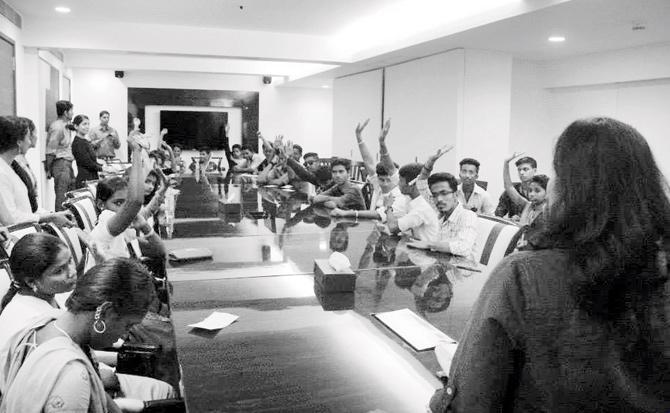
A career training session in progress
The vital cogs
The Antarang programme appears deceptively simple, yet is designed for the unique issues of its students. Since most parents work in the unorganised or domestic sector, concerns like tardiness, insolence, missing work without informing or sudden long absences exist. A large portion of the Antarang curriculum centres on punctuality, teamwork, time management, problem resolution, office manners, appropriate dress and other aspects of work ethic. Says Agrawal, “This is the first big lesson they learn — to be responsible and accountable — or face consequences. The behavioral transformation is rapid thereafter; they know that smaller things will bring them respect and credibility.”
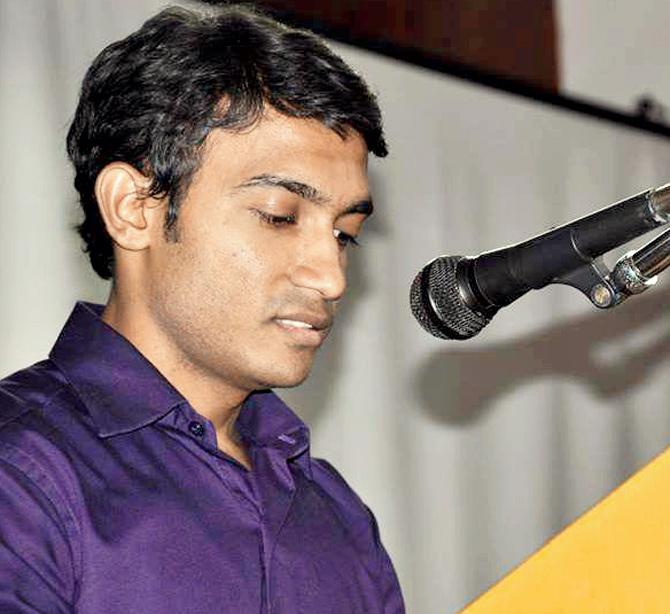
Avinash Yelve speaks of his experience to the audience
The NGO offers a mentorship programme for its students. The mentors, from mid-level managers to CEOs, become the students’ sounding boards as they navigate their way through corporate careers. Agrawal says, “To our delight, this turned out to be a synergistic relationship. The best mentors managed to remove any inhibitions in the kids and opened up a line of communication that was valuable to mentees and mentors, which honed their abilities to deal successfully with diverse populations.”
Shantanu Nalavadi, Managing Partner, Structured Investment Group at Piramal Capital has been an Antarang mentor for a year. He says, “Youngsters need someone with grey hair to guide them, the kind of salaries to expect, and to stick to a job once they get it. Else, some quit when the daily grind hits them, and sit jobless! So, at times, I have to use the carrot-and-stick approach with them.”
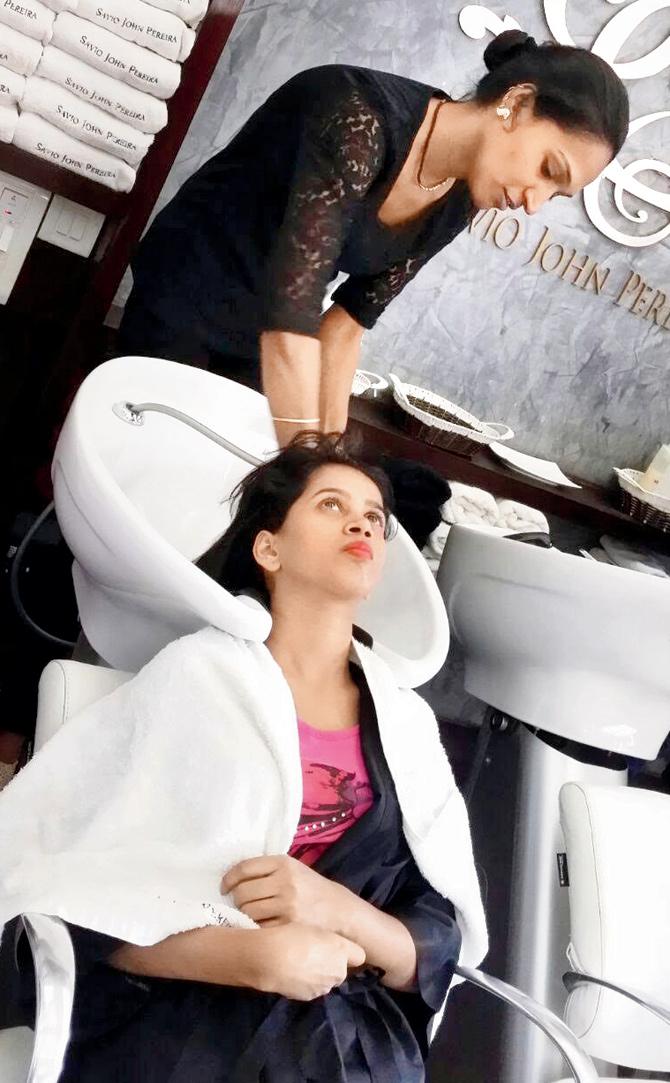
Reshma Sheikh is a trainee at a salon
Managing the mindset
A significant part of Antarang’s work is in managing the expectations and biases of stakeholders. If students have completed high school, they aspire for ‘good’ jobs, not ‘dirty’ ones. “In India, there is no dignity of labour, so these children consider chef’s assistants, housekeeping, beauticians, teaching assistant jobs as undesirable. A hairstylist, never mind the pay, remains a “nai” even if the boy is creative, talented and can be mentored by a known name. Instead, they want jobs at banks, government and the police force,” he says.
Adds Nalavadi, “My current kid wanted to do an accounts job, but since his friend’s sister got a job in HDFC’s outsourced services division, he insisted that he would take up only a bank job and sit at home till then. I had to make him realise that he isn’t qualified with education or experience. He has now begun work as an accountant with a small proprietary firm. Hopefully, he will get work at getting professionally qualified once he has gained some experience.”
Women face a different set of challenges where often while parents are more amenable to letting their daughters get trained, the pushback comes from their brothers. These boys aren’t comfortable with the idea of their sisters interacting with other men, and earning money (sometimes, more than then). Thankfully, the mindsets of corporate employers are in contrast.
“Our students hail from poor, marginalised segments. When we approach corporates to recruit them, we are asked questions like, ‘Will they steal, lie, run away with valuables and money, be rude, use abusive language, or get violent? Do they understand sexual and social propriety boundaries? Are they clean and do they take a bath?’ People can be less forgiving of a single transgression from these kids,” she adds.
Making the change happen
Yet, Antarang has found willing partners. About 200 students have been placed in companies like HDFC, HDB Financial services, Hyatt, Taj Group, Cafe Coffee Day, Trignomedia, Starbucks, Abaca and Crossword, among others. Nirav Shah, Partner Human Resources who hired Yelve recalls, “During our first interaction (at a Starbucks outlet) with students, we discussed things we do, expectations, work culture and a walk through. Students interacted with store partners for first-hand experience and tasted coffee. We hired four bright students.” There is much to be done, but when a pizza delivery boy understands customer satisfaction, a retail store manager is confident to interact with customers in English, and a young assistant learns the power and etiquette of emails, they set themselves up for rewarding careers that will transform the lives of their families and communities.
 Subscribe today by clicking the link and stay updated with the latest news!" Click here!
Subscribe today by clicking the link and stay updated with the latest news!" Click here!









